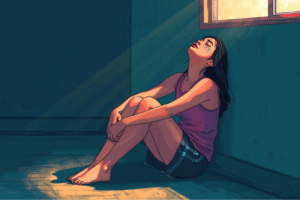Masking, sometimes referred to as camouflaging, refers to when someone hides who they are authentically in order to meet an expectation that does not align with their true self. In autistic and other neurodivergent communities, it means hiding one’s neurodivergent traits in order to meet neurotypical expectations for behavior.
You do not have to be neurodivergent to mask — if you interact with your employer differently than you interact with your best friend, for instance, you are likely masking. But autistic people who mask are not doing so simply because it is what is expected in the workplace; that masking goes deeper and is rooted in the message that neurotypical is the “right” or better way to be.
Not every neurodivergent person masks. Some have deliberately made efforts to unmask, and others are not able to mask at all. Many of the autistics who mask do so in response to negative and sometimes traumatic experiences when they show their authentic, unmasked self. Masking may be a way to protect themselves from bullying or other abuse.
The performance and energy that goes into masking is exhausting and not sustainable long-term. Masking can lead to burnout, depression, and even suicide. In this post, we’ll explore the hidden cost of masking for autistic adults, how you can cope, and if you are not autistic, how you can support your autistic loved ones in unmasking.
The Dangers of Masking
Constantly trying to present yourself in a way that is inauthentic is exhausting. When neurodivergent people mask continuously for years and years, we can become worn down. We might even experience burnout — a state of exhaustion, overwhelm, and inability to cope. Burnout can lead to needing time off work, an inability to participate in our communities, anxiety, depression, and even suicide.
But even if masking efforts have not caused burnout, they can cause other challenges. When you are constantly working to meet expectations rather than being authentic to yourself, you might not even know who you are without the mask. You may be so focused on being who you are expected to be that you do not learn who you are. This missing sense of self causes identity issues and makes unmasking difficult — how can I stop masking if I do not know who I am without the mask?
Masking can also increase risk for mistreatment. Many autistic and other neurodivergent individuals who mask do so in order to fit in and meet expectations. Unfortunately, when your top priority is fitting into someone else’s definition of who you ought to be, and that person wants you to do something that makes you uncomfortable, there is risk for exploitation and abuse.
Unmasking and The Right to Be Yourself
When you do not know who you are underneath your mask, unmasking can feel impossible. You have to get to know yourself all over again and figure out who you are when you are not masking and adapting yourself to other people’s expectations.
While difficult, unmasking is not impossible. It can be done! You might decide to work with a neurodiversity-affirming therapist to explore who you are without masking. Other ways that you can explore unmasking include:
- Talking to other members of your neurodivergent community about how they unmasked, and trying strategies they found effective.
- Thinking about who you are when no one is watching and when you are not controlling your movements, facial expressions, and words.
- Engaging in behaviors like stimming deliberately and seeing how you feel when you do the behavior.
You deserve to live as your authentic self, whatever that means and looks like for you. You deserve spaces where you can fully be you without fear of mistreatment.
Supporting Your Loved One in Unmasking
If you are not autistic but you care for someone who is, you might not know their authentic self as well as you think. They may be masking around you. Please know that many autistic and other neurodivergent individuals often mask even around people for whom they care deeply. They may be holding an internalized belief that they are unworthy or unlovable, unless they are masking, even if you did nothing to reinforce that belief. Do not take their masking personally.
Before talking to your loved one about their masking, please consider how you will react to seeing who they are unmasked. Unfortunately, many, many autistic and other neurodivergent people have experiences where someone has claimed to be a “safe” person and encouraged them to unmask, only to reject their unmasked self. Do not offer yourself as someone around whom they can unmask unless you truly mean it and are ready to accept them unconditionally as they are.
That means accepting them if they stim in ways that look strange to you. That means letting them make noises that you might find odd. It means not expecting them to perform their emotional expression in the way you expect or are used to. It means letting them be them, as they are.
If you cannot handle that, and you cannot support them as their full, unmasked self, it is better not to offer yourself as a safe person. Remember that many autistic people are literal in their communication, so if you say that you want to see them unmasked, they will likely assume that you mean it.
If you can be there for your loved one as they unmask, you can stand up for them if someone else is cruel to them in response to their unmasked behavior. You can work to educate others in their life so that it is not on the autistic person to also serve as a teacher about their experience. Most importantly, though, you can communicate with them directly and ask them what they want your support to look like.
Conclusion
Many autistics mask out of necessity, whether in response to punishment or rejection of their authentic self, or because they have not had a safe place to explore who they really are unmasked. An adult who has masked for several decades can find it difficult to take the mask off and learn who they are underneath, but the long-term effects of masking can be detrimental to Mental health.
If you are trying to unmask, know that you deserve to be your true and authentic self without the mask. If someone you love is unmasking, try to be a safe person who accepts them for who they are, no matter what.
To find a therapist, visit the Psychology Today Therapy Directory.
Learn more about supporting the autistic community with A Clinician’s Guide to Supporting Autistic Clients.













